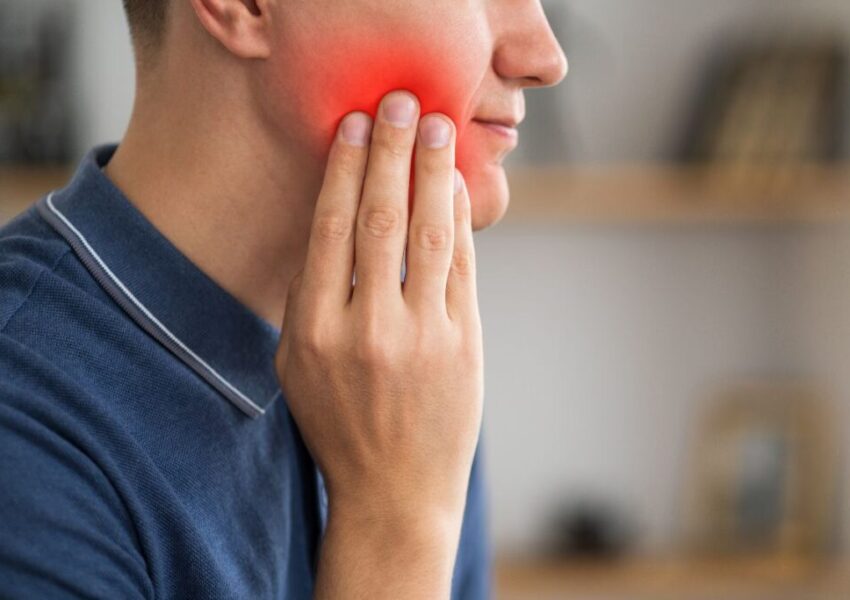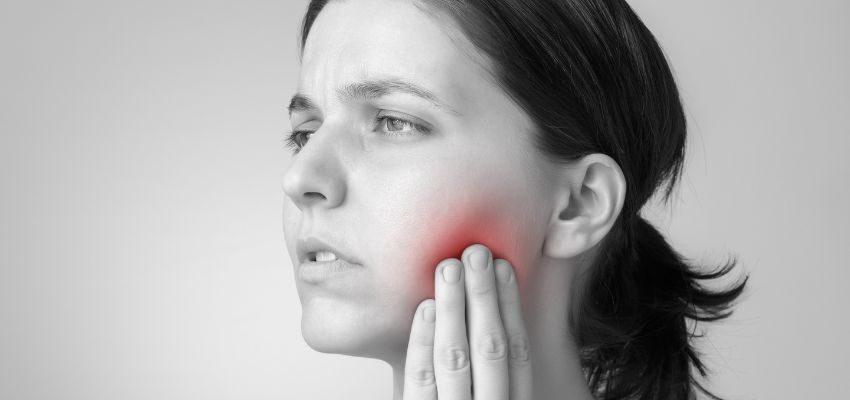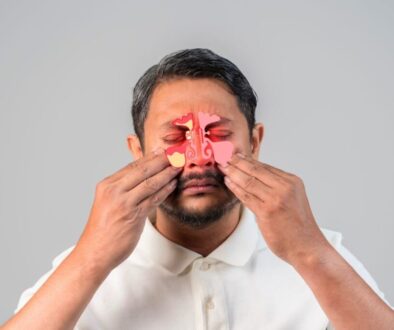Can A Toothache Cause Headache: What You Should Know

Published March 8, 2024
Toothaches are common and cause a great deal of discomfort. But can toothache cause headache? The short answer is yes. There’s a significant connection between these two types of pain. In this article, we’ll explore the link between toothaches and headaches. We’ll look at the conditions that may cause both and what you can do to manage these symptoms.
Is There A Connection Between Toothaches And Migraines?
A toothache can indeed trigger a migraine. This happens because the trigeminal nerve is responsible for face sensations and motor functions like biting and chewing. If you have a toothache, it can get irritated, and this irritation can trigger a migraine.
Possible Referred Pain To The Head
Referred pain occurs when discomfort is felt in a different location from the source. This phenomenon arises from the intricate nerve network within the body. For instance, in toothaches, the pain often radiates to the head.
Among the 12 cranial nerves, the trigeminal nerve is responsible for providing sensation to the face, mouth, and jaw. Pain signals travel through these nerve pathways in a tooth infection or abscess, causing sensations in various parts of the head and face. This results in referred pain, where a toothache may manifest as headaches, earaches, or discomfort in the neck and shoulders.
Referred pain is complex. It makes finding the source of discomfort hard. The source may differ from the perceived location of pain. With this in mind, if you have constant headaches or facial pain, dental issues could be the cause.

What Are The Underlying Conditions Causing Toothache And Headache?
Can toothache cause headache? It’s interesting to note that various conditions can simultaneously cause toothaches and headaches. Dental health is connected to well-being. This shows the importance of fixing oral health problems quickly. Doing so prevents potential pain and complications.
1. Teeth Grinding (Bruxism)
Bruxism is a condition marked by the habitual grinding or clenching of teeth. It can cause symptoms such as tooth pain, headaches, jaw discomfort, and worn-down teeth. It likely occurs during sleep but can also happen during waking hours. Sadly, it can impact oral health and well-being. If left untreated, bruxism may result in dental issues and persistent discomfort.
2. Tooth Decay And Other Dental Problems
Tooth pain with a headache could indicate dental issues like an infected or abscessed tooth. An infected tooth results from bacterial infection due to decay, gum disease, or tooth trauma. An abscessed tooth is a painful condition with bacteria invading the tooth’s pulp, causing pus buildup in nearby tissues.

3. Sinus Infection
A sinus infection or sinusitis can trigger a toothache and a headache. The pressure caused by the infection affects both areas, resulting in discomfort and pain in the face, head, and teeth. Symptoms might include nasal congestion, facial tenderness, and a reduced sense of smell. If untreated, sinus infections can persist. They may need medical care to reduce symptoms and stop complications.
4. Temporomandibular Joint Disorder
Temporomandibular joint disorder (TMJ) affects the joint connecting your jaw to the side of your head. It can cause symptoms like toothaches and headaches, disrupting daily life and quality of life. TMJ may result from various factors, including jaw misalignment, teeth grinding, stress, or arthritis. Getting a diagnosis and proper treatment is crucial for managing TMJ effectively.
5. Trigeminal Neuralgia
Trigeminal neuralgia, or tic douloureux, is a chronic condition that causes intense facial pain. The condition affects the trigeminal nerve, one of the cranial nerves responsible for sensations in the face. The pain can be intense and is often described as sharp, shooting, or similar to an electric shock.
6. Cavernous Sinus Thrombosis
A rare yet life-threatening condition that stems from untreated dental conditions. It involves blood clot formation in the cavernous sinus, a cavity behind the eyes. The condition often manifests with a severe headache as the main symptom. Timely medical attention is crucial to prevent further complications.

Management
Effective management of toothache-induced headaches relies heavily on identifying the root cause. Here are some widely used options:
- Over-the-counter pain medications. Non-prescription options, such as ibuprofen, acetaminophen, and aspirin, can ease minor toothache and headaches.
- Over-the-counter anesthetics. A topical anesthetic, such as Benzocaine, can be directly applied to numb the tooth and gums, offering relief.
- Cold compress. Use a cold compress on the affected side of your face to reduce inflammation and alleviate toothache and headache discomfort.
- Saltwater rinse. Gargle with warm salt water can help lessen the swelling. It can help mouth wounds heal and ease toothache.
- Hydrogen peroxide rinse. Rinsing with hydrogen peroxide eases pain. It also reduces inflammation and kills bacteria. This prevents further risk for infection.
- Dental procedures. The toothache and headache are caused by dental issues like a cavity or abscess. Specific dental treatments, such as cavity fillings, root canals, or tooth extractions, may be needed.
- Night guard. Custom-fitted night guards can benefit people who grind their teeth at night. They protect teeth from damage and reduce headaches.
Remember, these solutions offer temporary relief. But if you have an ongoing or severe toothache or headache, seek medical or dental advice.
When To Consult A Doctor?
If you have a toothache and a headache and over-the-counter remedies fail to work, seeking medical attention is crucial. If your symptoms are severe or worsening, you should promptly contact a healthcare professional.

Frequently Asked Questions About Toothache-Induced Headache
Why does a toothache worsen at night?
Toothaches can get worse at night. This is because lying down increases blood flow to the head. The added blood puts more pressure on the tooth and worsens the pain.
How can I ease a toothache and headache at home?
You can use over-the-counter pain medications, apply cold compresses, and rinse the mouth with warm salt water or hydrogen peroxide. These things can temporarily reduce discomfort. However, for persistent or severe symptoms, seeking medical or dental advice is best.
Which specialist should I see for a toothache?
A dentist should be your initial contact for a toothache. If the pain continues, especially with headaches, you may need to see a general physician or neurologist.
Can a tooth infection induce dizziness?
Dizziness can result from a tooth infection spreading to the ears or sinuses, impacting balance. Symptoms such as fever and fatigue can worsen dizziness.
Unveiling The Connection Between Toothaches And Headaches
Toothaches and headaches are common. Now you understand their connection: “Can toothache cause headache.” However, they might signal underlying health issues. If you experience persistent or severe tooth or head pain, seek medical help promptly. Diagnosing and treating a problem early can reduce immediate pain. Prioritizing your health today is vital to ensure a healthier future tomorrow.
Benefit From The Latest Advancements In Probiotic Science With Bionaze
Bionaze is a proprietary blend of probiotics proven to promote ear, nose, and throat health, improve digestion, and support your immune system. The active ingredients BLIS K12, and BL-04 are considered among the best probiotics according to science.
Get 25% Off Your First Order when you use BIO25 at checkout!

This Content Has Been Reviewed For Factual Accuracy
This content has undergone thorough fact-checking by our team of internal experts. Learn more about the meticulous editorial standard for our website here.
ADVERTISEMENT

About The Author
Hi, I’m Corinne Grace, a proud nursing graduate from Riverside College with a flair for writing. I specialize in health and wellness topics, using my educational background to weave informative and attention-grabbing articles that appeal to a wide variety of readers. Committed to excellence in writing, I’m always refining my skills to stay in sync with the fast-evolving world of digital media. Whether you’re seeking to understand complex health concepts or looking for relatable advice, I’m here to deliver content that’s accurate and enjoyable to read.




